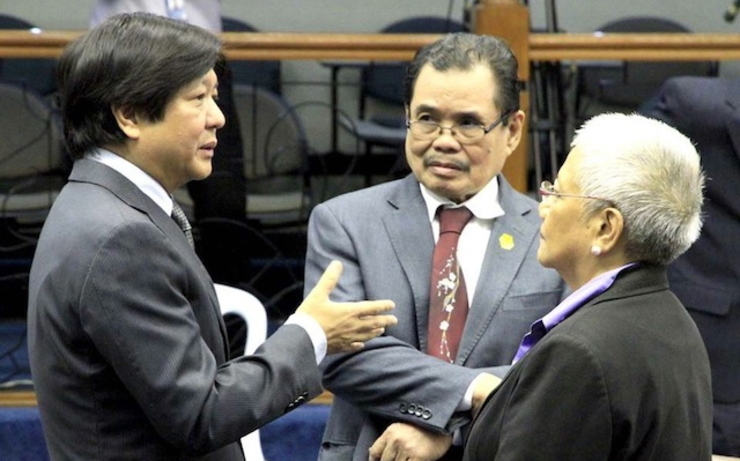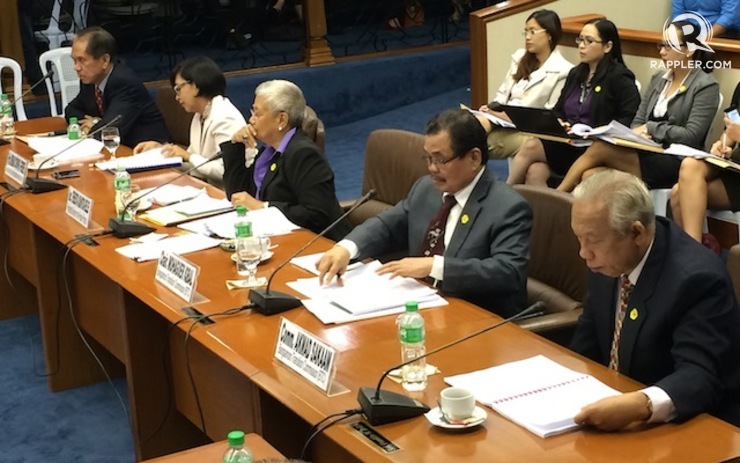Senators raise concerns over the 'single biggest issue' in creating a Bangsamoro entity: Will central government still prevail over the Bangsamoro government?

FIRST BRIEFING. Senator Bongbong Marcos (left), chair of the Senate Committee on Local Government, talks to Office of the Presidential Adviser on the Peace Process (OPAPP) Secretary Teresita Quintos-Deles (right) and Bangsamoro chairman Mohaguer Iqbal (center) before the start of a briefing on the proposed Bangsamoro Basic Law. Photo by Albert Calvelo/PRIB
It's a criticism that has been hurled at the proposed law seeking to create a new autonomous government in Mindanao – that it creates a state within a state, threatening the sovereignty of the
On the first
Senate briefing on the proposed Bangsamoro Basic Law on Tuesday, September 23,
Senator Ferdinand "Bongbong" Marcos Jr asked the peace panels that
negotiated and crafted the bill about the "elephant in the room."
Marcos cited the
2008 Supreme Court decision, which junked as unconstitutional the Memorandum of
Agreement on Ancestral Domains between the Arroyo government and the Moro
Islamic Liberation Front (MILF) that sought to create a Bangsamoro Juridical
Entity.
"If the
Bangsamoro Juridical Entity is a state in all but name as it has a permanent
population, a defined territory, a government, and a capacity to enter into
relations with other states, this would seem to describe as well the Bangsamoro
(political entity). Why is it not a state within the state?" said Marcos,
who chairs the Senate committee on local governments.
Government peace
panel chair Miriam Coronel Ferrer answered: "Your honor, I think the first
criteria actually applies to all local government [units]. With regard to the
third criteria, it's very clearly stated in the draft bill in accordance with
the Constitution that the matter over foreign policy, foreign affairs belongs
to the central government and is co-shared with the Senate when it comes to
ratification of treaties."
Under the final peace agreement signed by
the government and the MILF in March, powers would be divided into
reserved powers for the central government, exclusive powers for the
Bangsamoro, and shared powers between the two.
Marcos noted that
there are specific powers devolved to the Bangsamoro that could impinge on the
sovereignty of the state. For instance, barter trade and counter-trade with
ASEAN countries is listed under the exclusive powers of the Bangsamoro
government – a power that would involve foreign policy.
"[If we
compare them with other LGUs], LGUs are not allowed to enter joint economic
agreements, they cannot take out loans from foreign entitties or foreign banks,
whereas the Bangsamoro is allowed to do that, so there is a difference,"
Marcos said.
Presidential
Adviser on the Peace Process Secretary Teresita Deles clarified that the power
is limited to the regulation of barter trade.
"They are
not allowed to enter into agreements. In fact, this is already a devolved power
under Republic Act 9054 (the ARMM Organic Act)," Deles said.
During the early
parts of negotiations with the Aquino government, the MILF had proposed for a
sub-state that will continue to be under the central government.
While panels have
argued that the eventual final peace agreement does not create such, Senator Miriam Defensor Santiago,
a constitutional expert, has called it as unconstitutional as it "attempts
to redefine the sovereignty" of the Philippines.
“The Philippine
Constitution provides for the powers of the state. The Constitution is supreme.
The Agreement reserves to the central government the exercise of so-called
‘reserved powers,’ which are described as powers ‘retained by the central
government.’ Thus, the Agreement diminishes the sovereignty of the Philippine
government by listing what are the powers that the central government can
retain," Santiago
This provision is
only one of the many issues that senators said the defenders of the Bangsamoro
bill need to clarify.

DELIBERATIONS. The defenders of the Bangsamoro Basic Law faces the Senate for the first time since the measure was submitted to Congress. Photo by Rappler
'More
clarifications needed'
How power will be
shared between the central government and the Bangsamoro government is the
"single biggest subject" that needs to be deliberated on about the
proposed law, Marcos said.
The Bangsamoro
bill seeks to establish an autonomous government in Mindanao
that will replace the Autonomous Region in Muslim Mindanao and give the ne
entity wider political and fiscal autonomy.
It will be
parliamentary in form, to be composed of a combination of political parties
elected through proportional representation, district representatives, and
reserved seats similar to the current party-list system.
It is also
designed to get automatic appropriations similar to the internal revenue
allotment of LGUs. Under the bill, the Bangsamoro will get a 4% share in
national internal revenue collections, to be taken from the national
government's share.
With a new kind
of autonomy being proposed for the Bangsamoro, senators Aquilino Pimentel III
and Pia Cayetano shared Marcos' concerns about how possible conflicts between
the Bangsamoro government and the central government will be solved.
Marcos asked:
What if, in the transition process, there are issues that cannot be resolved?
Who will prevail?
Deles said:
"The President. The President is the only President there is."
Senators
questioned the definition of the phrase "parity of esteem," referred
to in the proposed law as the concept stating that: "The Central
Govenrment shall respect the exercise of competencies and
exclusive powers of the Bangsamoro government. The Bangsamoro Government shall
respect the exercise of the competencies and reserved powers of the Central
Government."
Marcos said the
provision gives yet another impression that the Bangsamoro government is on
equal footing as the national government, giving rise to the issue of
sovereignty.
Lawyer Bong
Montesa, one of the independent lawyers who assisted the Bangsamoro Transition
Commission, the body which crafted the first draft of the law, said
"parity of esteem" does not refer to "parity of powers" but
is about "mutual respect" for the "competencies" of the
national and Bangsamoro government.
Other concerns on
power-sharing raised in the briefing included:
Under the
power-sharing provisions of the Bangsamoro Basic Law, a Philippine
Congress-Bangsamoro Parliament Forum will be created. If there are
contradictory enactments by the Bangsamoro legislature and the Philippines
Congress, this is to be negotiated? What law will be followed?
What if there is
a difference between the Bangsamoro development plan and the national
development plan, which will prevail?
The BBL seeks to
create a Bangsamoro police that will still be part of the Philippine National
Police. Will they be under the direct control of the PNP chief? Can they be
ordered by the PNP chief to carry out duties? Who will prevail between the
chief minister and the PNP chief?
The BBL seeks to
create a Bangsamoro Commission on Audit, without prejudice to the powers of COA
to audit the autonomous government. In case of disparity in their findings,
which one will prevail?
On the Philippine
Congress-Bangsamoro Parliament Forum, government legal counsel Anna Tarhata
Basman said national distinction will still apply, and the forum only enables
both bodies "to prevent contradictions" and harmonize legislations.
Marcos asked:
What if the conflict is not resolved?
The panels did
not give a direct answer. Instead, Ferrer provided a background on how the
provision came into being.
On the difference
between the national and Bangsamoro development plan, Deles said mechanisms
will be put in place to harmonize the two. Bangsamoro Transition Commission
chairman Mohagher Iqbal said the Bangsamoro development plan will be a
"replica" of the government development plan.
On the
jurisdiction of the Bangsamoro chief minister and the PNP over the Bangsamoro
police, Ferrer said: "It's going to be shared power just like in the
exercise of powers in LGUs, where LGUs exercise operational control and
supervision as well."
Marcos asked
whether the PNP chief can countermand the order of the chief minister.
Deles answered:
"In principle, yes, since the Chief Minister also gets his powers from the
regional police board, which is part of National Police Commission."
On auditing
bodies, government peace panel member Senen Bacani said the Bangsamoro
Commission on Audit will have a mandate similar to the internal audit of
private corporations, with external audit done by the national COA.
Marcos said the
Senate will engage with Iqbal on how far Congress can amend the proposed law
with respect to the peace accord signed.
"The
principle they are affirming is that of affirmative action because Bangsamoro
lands have been left behind in terms of investment. But then, again, many LGUs
make the same argument," Marcos said. Whatever it is, again, the
Bangsamoro would have to explain exactly why their situation is not the same
with other regions."
The present ARMM
is plagued by poverty as it continues to suffer from the lowest gross regional
domestic product in the country.
The proposed
Bangsamoro Basic Law seeks to create institutions that will put an end to 4
decades of armed struggle in Mindanao that has
killed over 120,000 people.
Skepticism
Senator JV
Ejercito urged the peace executives to talk to local officials in areas that
will be included in the plebiscite. Ejercito said many mayors he has talked to
have expressed skepticism over joining. He did not name who the mayors were.
Deles said she
believes the skepticism over the proposed Bangsamoro is borne out of the lack
of information about it.
In a short speech
before the briefing started, Iqbal sought to address comments that the creation
of the Bangsamoro government is divisive and is only a ploy of the MILF toward
gaining independence.
"What
divides the country is neglect, the lack of appreciation for diversity,"
Iqbal said. "The Bangsamoro is our best insurance against independence. If
the Bangsamoro work to bring peace, then independence will become less attractive.
Look at the result of the no vote for Scotland
The Tuesday
briefing is only the first of a series of hearings on the proposed law.
The House of
Representatives is set to conduct its first committee hearing on the BBL on
Wednesday, September 24.
Both the Senate
and the House will conduct hearings in Mindanao .

No comments:
Post a Comment
Note: Only a member of this blog may post a comment.